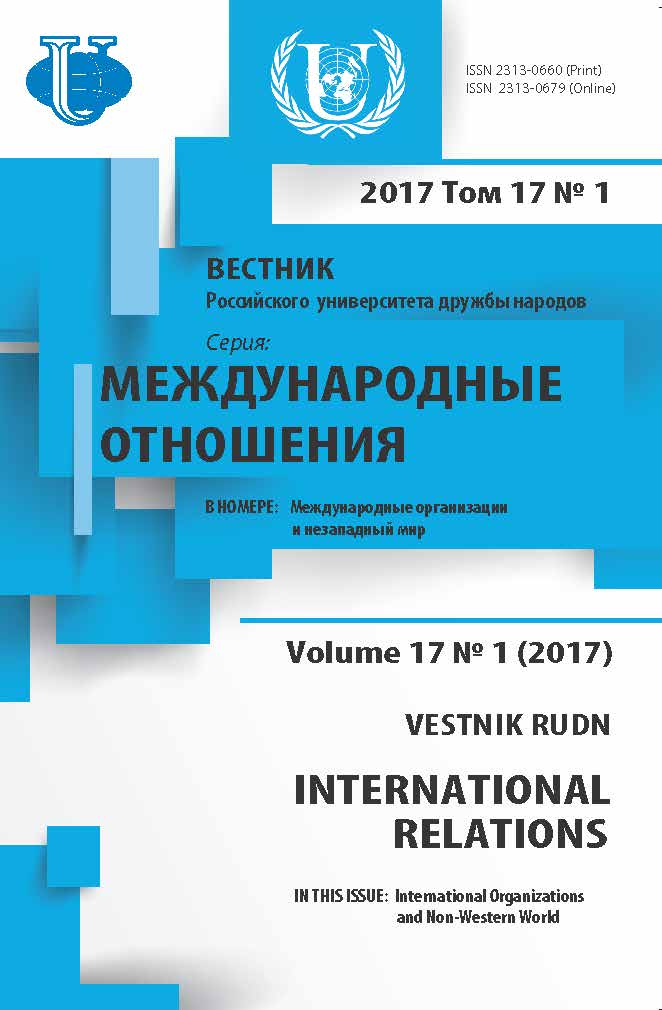IMF and socio-political processes in the post-soviet space
- Authors: Fedorchenko S.N.1
-
Affiliations:
- Moscow State Regional University
- Issue: Vol 17, No 1 (2017): International organizations and Non-Western World
- Pages: 22-33
- Section: THEMATIC DOSSIER
- URL: https://journals.rudn.ru/international-relations/article/view/15874
- DOI: https://doi.org/10.22363/2313-0660-2017-17-1-22-33
Cite item
Full Text
Abstract
The article shows that the practice of the International Monetary Fund to provide loans to countries in need starts an unexplored chain reaction of changes in the socio-political processes. As a working hypothesis, the author proposes the following assumption: functioning in the conditions of post-Soviet societies, where for a long time a key role in the economy and politics was played by the state, the IMF had underestimated the strong request of the local population to support the social sector by the government, which led to two consequences of his consulting activities - fund recommendations actually led to the stabilization of financial systems in the region, but on the other hand - to the inconsistency and incompleteness of the modernization of the structural reforms. Citizens criticized the reduction of subsidies for social segments, so the post-Soviet elites constantly fluctuated in relation to the full implementation of the recommendations of the IMF package. The author is of the opinion that the post-Soviet government in fact limited the maneuver of the fund, hence in some cases, even an international organization had to make concessions and indulgence of their original demands. The lack of a unified approach and long-term lending between the post-Soviet elite and the IMF provoked disappointment of the population of the need for liberalization and weakening of the state institution, as well as create conditions for social instability up to the “color revolutions”. The study is based on data of sociological surveys of the population.
About the authors
Sergey Nikolaevich Fedorchenko
Moscow State Regional University
Author for correspondence.
Email: s.n.fedorchenko@mail.ru
Moscow, Russia
References
- Alidzhanov, D. A. (2016). Monetary and credit mechanisms of import substitution economic growth stimulation in the Republic of Tajikistan. Ekonomicheskiy zhurnal, 3(43), 12—29 (In Russ.).
- Anan'yev, A. S. (2008). Comparative analysis of the IMF in countries with transformed economy [dissertation thesis]. M.: Finansovaya akademia pri Pravitel'stve Ros. Federatsii (In Russ.).
- Arseenko, A. G. (2014). Antisocial innovation the World Bank and the IMF in the post-soviet region (on an example of Ukraine). In: Sotsial'nye innovatsii v razvitii trudovykh otnosheniy i zanyatosti v XXI veke. Pod obsh. red. Z. Kh. Saralievoy. Nizhniy Novgorod: NISOTs, p. 117—121 (In Russ.).
- Arkhipova, V. V. (2016). The influence of “sudden stops” in capital flows on the national economy. Vestnik Finansovogo universiteta, 5, 115—125 (In Russ.).
- Bardin, A. L. (2013). Principles of the global governance on the basis of international financial institutions. Polis. Politicheskie issledovaniya, 4, 168—172 (In Russ.).
- Bardin, A. L. (2014). Political aspects of the IMF and the World Bank in Ukraine. Vlast', 10, 220—224 (In Russ.).
- Barisitz, St. (2016). Belarus in recession, banking sector in difficulties — Russia to the rescue. Focus on European economic integration, 3, 41—49.
- Chanturidze, L. (2006). Kyrgyzstan at a crossroads: the economic causes of the “Tulip Revolution”. Tsentral'naya Aziya i Kavkaz, 4 (46), 74—84 (In Russ.).
- Chanturidze, L. (2005). IMF recommendations to Georgia: the road to the “Temple of plenty” or a path to the germination of poverty? Tsentral'naya Aziya i Kavkaz, 6 (42), 140—151 (In Russ.).
- Degterev, D. A. (2016). The Political Influence in the International Financial System. Vestnik mezhdunarodnyh organizacij. 11 (4), 77—105 (In Russ). doi: 10.17323/1996-7845-2016-04-77.
- Dabrowski, M. (2016). Belarus at a crossroads. Bruegel Policy Contribution, 2, 1—10.
- Hachatryan, A. (2009). Armenia crisis and the fundamental problems of the economy. Central'naya Aziya i Kavkaz. 6 (66), 50—59 (In Russ.).
- Huygen, Ch. (2011). One Step Forward, Two Steps Back: Boris Yeltsin and the Failure of Shock Therapy. Constellations, 3 (1), 63—73.
- Igamberdiev, B. A., & Tegizbekova, Zh. Ch. (2014). History of Kyrgyzstan as a process of realization of an individual interest in light of inefficient economic management. Vestnik KRSU, 6, 118—122 (In Russ.).
- Konnov, V. A. (2014). On the question of the legal features of allocation by the International Monetary Fund for financial assistance to Ukraine. Teoriya i praktika obshchestvennogo razvitiya, 4, 159—161 (In Russ.).
- Odling-Smee, Dzh. (2005). Relations between the IMF and Russia in 1990. Sotsial'nye i gumanitarnye nauki. Otechestvennaya i zarubezhnaya literatura. Seriya 2: Ekonomika. Referativnyy zhurnal, 3, 79—88 (In Russ.).
- Sidorova, E. A., & Baranova, M. S. (2015). The problem of global governance and the role of the Inter¬national Monetary Fund. Vestnik NGU. Seriya: Social'no-ehkonomicheskie nauki, 15, 2, 15—22 (In Russ.).
- Smyslov, D. V. (2010). The history of Russia's relations with international financial organizations. URL: http://www.ru-90.ru/node/1215 (In Russ.) (accessed: 07.12.2016).
- Stone, R. W. (2011). Controlling Institutions: International Organizations and the Global Economy. Cambridge: University Press.
- Tolochko, O. N. (2012). Implementation of the rules of international economic law through participation in international economic organizations (Case of the Republic of Belarus). Izvestiya vysshikh uchebnykh zavedeniy. Pravovedenie, 1, 170—176 (In Russ.).
- Vardomskij, L. B., & Pylin, A. G. (2010). Global Crisis in Ukraine: Causes of deep recession and contradictions of economic policy. Belorusskij ehkonomicheskij zhurnal, 1, 4—16.
- Woods, N., & Lombardi, D. (2006). Uneven Patterns of Governance: How Developing Countries are Represented in the IMF. Review of International Political Economy, 13 (03), 480—515.











